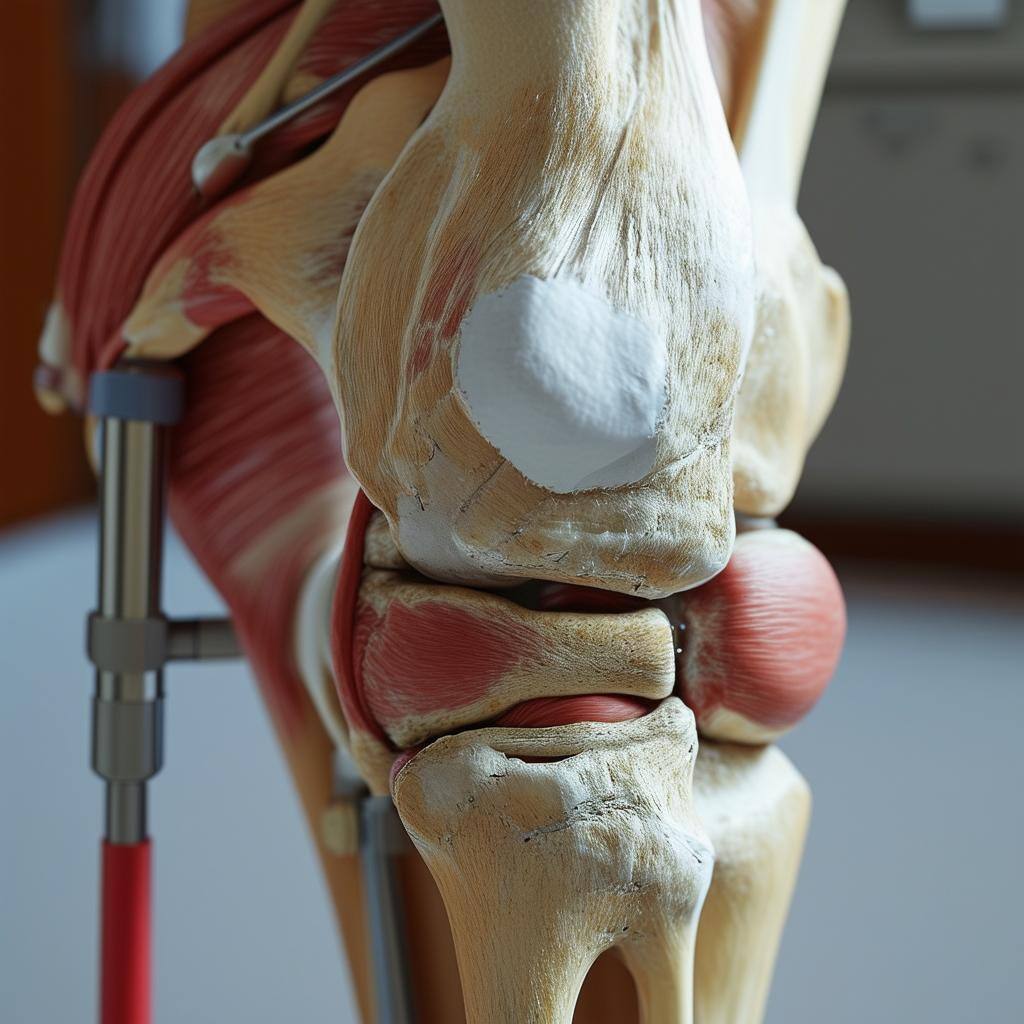
Knee pain affects many people, impacting daily routines and overall quality of life. Whether it's a minor inconvenience or a debilitating issue, knowing when to see a doctor can make a significant difference.
What You'll Learn
In this article, we'll cover:
- Common causes of knee pain.
- Indicators that suggest you should consult a knee doctor.
- Tips on finding the right specialist for your needs.
Discovering the right time to seek medical attention can help you take charge of your joint health and ensure timely intervention. For information on related procedures, check out our guide on knee replacement surgery.
Understanding Knee Pain
Common Causes of Knee Pain
Knee pain can arise from various conditions and situations:
- Injuries: This includes ligament tears, such as the ACL (anterior cruciate ligament), meniscus injuries, and fractures.
- Arthritis: Osteoarthritis is a common culprit, especially among older adults. Rheumatoid arthritis can also affect the knee joint.
- Overuse: Activities that involve repetitive motion, like running or cycling, can lead to overuse injuries including tendinitis and bursitis.
Symptoms That Accompany Knee Pain
Identifying the symptoms that come with knee pain is crucial for understanding its severity:
- Swelling: Swelling around the knee can indicate inflammation or fluid build-up.
- Stiffness: Difficulty in moving the knee joint can suggest underlying issues such as arthritis or injury.
These symptoms provide important clues about the condition of your knee. Persistent swelling and stiffness often necessitate seeking professional medical advice.
For more information about finding a specialist, you can check resources like Top Doc to connect with qualified doctors.
TopDoc - Total Shoulder Replacement Procedure Details also offers insights into advanced treatments for joint issues, which might be relevant in understanding comprehensive care options.
By recognizing these common causes and symptoms, you are better equipped to determine when it is essential to consult a knee doctor.
Signs You Should See a Knee Doctor
1. Persistent Pain
Persistent pain in the knees can be described as discomfort that lasts for an extended period, often without significant improvement despite rest and home treatments. This type of pain can manifest in various forms, such as:
- Aching or throbbing pain: Continuous dull ache that doesn't subside.
- Sharp pain during movement: Intense pain when bending or straightening the knee.
- Pain that worsens with activity: Increased discomfort during or after physical activities.
Recognizing persistent pain is crucial because it often signals an underlying issue that requires professional medical evaluation. Chronic knee pain should not be ignored, especially if it interferes with daily activities like walking, climbing stairs, or sleeping.
Importance of Consulting a Doctor
When home remedies and over-the-counter medications fail to alleviate knee pain, it's essential to seek medical advice. A qualified knee doctor can:
- Perform a thorough examination to diagnose the root cause of your pain.
- Recommend appropriate treatments, which may include physical therapy, medication, or surgical options.
- Help prevent further damage and improve your overall quality of life.
For those experiencing severe arthritis or injury-related knee pain, considering advanced treatments like knee replacement surgery might be necessary. This transformative procedure can significantly enhance mobility and reduce chronic discomfort.
Understanding when to see a knee doctor ensures timely intervention and effective management of knee-related issues.
2. Swelling and Redness in the Knee Joint
Knowing when to seek professional help is crucial. If you notice swelling and redness around your knee joint, it could indicate inflammation or an infection.
1. Inflammation
Conditions like arthritis or bursitis can cause inflammation. You might observe:
- Puffiness around the knee
- Warmth in the area
- Tenderness when touched
2. Infection
An infection in the knee, known as septic arthritis, can lead to significant swelling, redness, and warmth around the joint. This condition often requires immediate medical treatment.
If you experience these symptoms, it's essential to seek prompt medical attention. Delaying can result in more severe complications. Persistent swelling and redness warrant a visit to a knee doctor for a thorough medical evaluation.
3. Difficulty Bearing Weight on the Affected Leg
It's important to know when to seek professional help for your knee problem. One clear sign that you need to see a doctor is if you can't put weight on the affected leg. This could mean there's a serious injury or another issue going on.
Possible Reasons for Difficulty Bearing Weight:
- Serious Injury: If you have a fracture, torn ligament, or bad sprain, you might find it hard to put weight on your leg.
- Chronic Knee Pain: Ongoing pain when standing or walking could be a sign of long-term problems like arthritis or tendonitis.
It's crucial to see a healthcare professional as soon as possible. Waiting too long for an assessment could make things worse and lead to complications down the road.
Why You Should Get a Healthcare Assessment:
- A thorough examination can help pinpoint the exact issue and inform the best treatment options.
For more information on community standards for providers, you can visit TopDoc - Provider Community Standards.
4. Visible Deformities in the Knee Area
It's important to spot any visible deformities in the knee. These irregularities often indicate serious issues like fractures or dislocations, which require immediate medical attention.
1. Fractures
When a bone breaks, it can cause the knee to look misshapen. This needs quick action to avoid long-term harm.
2. Dislocations
A dislocated knee joint means the bones have moved out of position. This is not only painful but can also harm nearby ligaments and tissues.
Visible deformities should never be ignored. Seeking a medical evaluation from a qualified knee doctor ensures proper diagnosis and treatment, helping you avoid complications and chronic knee pain. Identifying these indicators early guarantees the best chance for a full recovery.
5. Instability or Giving Way Sensation in the Knee Joint
Experiencing instability or a sensation of the knee giving way during movement can be alarming and is often indicative of underlying issues. Symptoms may include:
- Wobbling: Feeling that your knee wobbles or is unstable when walking or performing activities.
- Giving Way: Sensation that the knee might buckle or give out, especially during weight-bearing tasks.
Recognizing these signs is crucial. Instability often points to potential ligament injuries, such as a torn ACL (anterior cruciate ligament) or damage to other stabilizing structures within the knee. These conditions require prompt medical evaluation to prevent further damage and to determine appropriate treatments.
If you notice these symptoms, it’s a clear indicator of when to see a knee doctor for chronic knee pain. Ignoring these signs can lead to worsening instability and increased risk of falls or additional injuries.
6. Reduced Range of Motion Due to Swelling Restrictions
Swelling can significantly limit the normal range of motion in the knee joint, making everyday activities difficult and painful.
Mobility Issues
Swelling often results in stiffness, preventing you from fully bending or straightening your knee. This can affect walking, climbing stairs, and even simple movements like sitting down or getting up.
When to Seek Medical Attention
If swelling persists and restricts your knee's range of motion for more than 24 hours, it is essential to consult a knee doctor. This could indicate underlying issues such as ligament damage, cartilage wear, or other chronic conditions that require professional medical evaluation.
Recognizing these indicators is crucial for timely intervention to maintain mobility and prevent long-term damage.
7. Long-Term Discomfort Affecting Your Daily Life or Sports Performance
Knowing when to consult a knee doctor for ongoing knee pain is essential. Long-lasting discomfort can greatly affect everyday tasks and sports activities. Here's what you should know:
For Athletes
If knee pain lasts more than 48 hours, it might indicate a more serious problem that needs medical attention. Ignoring the pain could result in worse injuries and longer recovery times.
For Non-Athletes
If you have persistent discomfort that lasts three weeks or more, it's time to see a specialist. Ongoing knee pain can impact your ability to do daily activities like walking, commuting, or even sleeping.
It's important not to overlook these signs, as they can worsen the condition. Seeking prompt treatment is crucial for effective recovery.
8. Fever Accompanying Knee Pain Symptoms
Recognizing specific indicators is crucial when determining when to see a knee doctor. One such indicator is the presence of fever accompanying knee pain.
1. Emergency Indicator
A fever alongside swelling and redness around the knee often points to an infection. This combination of symptoms requires urgent medical evaluation to prevent complications.
2. Infection Emergency
Infections in the knee joint can lead to severe issues if not treated promptly. Signs of infection include:
- High temperature
- Redness around the joint
- Significant swelling
- Warmth in the affected area
When experiencing these symptoms, it's vital to seek immediate medical care. Chronic knee pain combined with fever signals the need for professional intervention. Ignoring these signs can lead to more severe health problems, emphasizing the importance of timely consultation with a healthcare provider.
Finding the Right Knee Doctor for Your Needs
What to Look for in a Qualified Knee Specialist
When searching for an orthopedic specialist, consider these factors:
- Qualifications: Ensure the doctor is board-certified in orthopedic surgery or sports medicine. This certification indicates advanced training and expertise in treating musculoskeletal issues.
- Experience: A specialist with extensive experience in knee-related conditions can provide more accurate diagnoses and effective treatments. Look for doctors who have been practicing for several years and have treated a variety of knee problems.
- Specialization: Some orthopedic doctors specialize specifically in knee injuries and disorders. Finding a specialist focused on knees can be beneficial, especially for complex conditions or surgical interventions.
How to Find Reputable Orthopedic Doctors
Finding the right doctor involves:
- Online Resources: Use search terms like "orthopedic specialists near me" to find local professionals. Websites such as Healthgrades, Zocdoc, and Vitals offer patient reviews and detailed information about doctors’ qualifications and specialties.
- Referrals from Trusted Sources: Ask your primary care physician, friends, family, or other healthcare providers for recommendations. Personal referrals often come with insights into the doctor's bedside manner and effectiveness.
Taking these steps will help ensure you receive expert care tailored to your specific needs.
Conclusion: Taking Charge of Your Joint Health with Timely Medical Intervention!
Recognizing the importance of timely treatment for knee pain is crucial to safeguarding your joint health. Ignoring symptoms can lead to more severe issues that could have been prevented with early intervention.
- Seek medical advice when experiencing persistent pain, swelling, or difficulty bearing weight.
- Pay attention to signs like deformities, instability, and reduced range of motion.
- Fever with knee pain requires immediate attention.
Proactive steps in addressing knee pain ensure a quicker recovery and a better quality of life. Prioritize your joint health by consulting a qualified specialist when necessary.
FAQs (Frequently Asked Questions)
What are common causes of knee pain?
Common causes of knee pain include injuries, arthritis, and overuse. These factors can lead to various symptoms that affect daily activities.
When should I see a knee doctor?
You should see a knee doctor if you experience persistent pain, swelling and redness in the joint, difficulty bearing weight, visible deformities, instability in the knee, reduced range of motion due to swelling, long-term discomfort affecting daily life or sports performance, or fever accompanying knee pain symptoms.
What does persistent knee pain indicate?
Persistent knee pain may indicate an underlying issue that requires medical evaluation. It is important to consult a doctor if home treatments fail to provide relief.
What are signs of infection in the knee?
Signs of infection in the knee include swelling and redness around the joint. If these symptoms occur alongside fever, it is crucial to seek immediate medical attention.
How can I find a qualified knee doctor?
To find a qualified knee doctor, look for orthopedic specialists with relevant qualifications and experience. You can use online resources or ask for referrals from trusted sources to locate reputable doctors near you.
Why is timely treatment important for knee issues?
Timely treatment is crucial for effective recovery from knee problems. Early intervention can prevent further damage and improve overall joint health.


Comments (0)